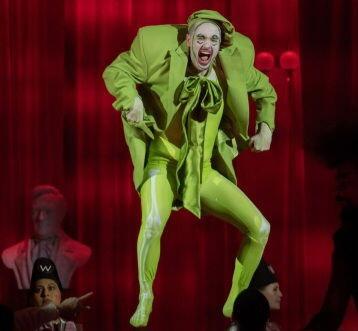Wahnfried - a Brilliant Must-See

Why would a Jewish composer, such as Avner Dorman (https://www.avnerdormanmusic.com/) , write an opera about the Wagner family and its notorious entanglement with the Nazi Party, an opera that actually features Corporal Hitler on stage?
That's why. Because he's Jewish. For the same reason Daniel Barenboim conducted the entire Ring Cycle, courting disapproval and confronting everything sensitive and controversial about Wagner.

Wahnfried is a satirical, darkly comic opera that shows us how Wagner became appropriated after his death and moulded by those who claimed to be perpetuating his legacy. The Kaiser and the Nazis took their lead from a now-forgotten English entomologist named Houston Stewart Chamberlain, who took Darwin's theory of natural selection as proof of Aryan superiority. Houston, who wrote best-selling books and married into the Wagner family, fixed the identity the Wagner cult for a century. He won the approval of the Kaiser and of Wagner's widow Cosima, who was longing for a strong man to play the leadership role that her son, Siegfried, seemed so unsuited and reluctant to play.
In this opera Chamberlain (sung by Mark le Brocq, who was such a brilliant Loge in the Ring) is presented as a half-comic, half-pathetic figure, dressing in leder-hosen and drawn into the cult because it seems to offer a chance of becoming somebody, yet finding in the end only oblivion.
A major role is also taken by Hermann Levi (sung by Edmund Danon), the Jewish musician whom Wagner actually chose to conduct his final opera, Parsifal, his spiritual statement. Levi challenges Chamberlain, pointing out that he, as a musician, understands Wagner far better than any butterfly expert could possibly do, and that his Jewishness was not considered a barrier by the composer himself. Nobody listens.
So the opera explores how the Wagner-cult acquired a life and momentum of its own. It attracted devout acolytes, and led to ugly conflicts in the Wagner family. We learn that Cosima Wagner (sung by Susan Bullock) actually destroyed quite a lot of his letters and diaries in order to make sure his image fitted a German imperialist agenda. The Wagner-Daemon, brilliantly performed by Oskar Macarthy, appears, to protest in vain at what is being done.
The score is marvellously inventive, lyrical, witty and variegated in its colouring. The wonderful Longborough orchestra under Justin Brown, creates a range of arresting, perturbing and expressive sounds.
The style of the opera is not, despite what many critics are saying, "Absurdist" (which means negative, presenting existence as pointless or meaningless). It is satirical, parodic and caustic, eclectic and ironic, very much in the tradition of Berthold Brecht and Kurt Weill. The style of the costumes, movement and dance combines elements of burlesque, cabaret, music-hall, Picasso's Pierrots, silent movies (in the use of placards with wording) and the most grotesque cartoons of the Weimar Republic era, to arrive at a ghastly hilarity.
After Longborough's triumphant Ring cycle last year, to put on Wahnfried is a significant choice, a challenge to those who say that Wagner's music can only be meaningful to certain people in a certain frame of understanding. Wahnfried asserts that Wagner can be reclaimed for all. It is also timely at this moment, when a romance between Leftism and Islam is making anti-Semitism fashionable again. The evening before this performance, I attended an event of the Oxford Poetry Circle devoted to poems of compassion for the people of Gaza. There was not one word of sympathy for all the other victims of this conflict, including the 58 hostages still being held, or the Jewish people being murdered for political motives in other parts of the globe. Such a degree of bias is blinkered and dangerous. (https://www.commongroundoxford.com/upcoming-events)
I will end this review with an anecdote. When I was a student in Reading in the 1970s, I used to visit an art shop in the London Road, run by an octogenarian named Gerald Tooby. He had trained as an artist in his youth, and practised too, then ended up becoming an art dealer. He had a number of drawings by Gwen John for sale, and I rather wish I had bought them, but of course I could not afford to do so. He drew my portrait, or tried to do so despite suffering from cataracts, and while sketching he told me how, as a young man, he had studied art in Vienna, before the First World War. Around 1910, there had been a competition for a statue of Wagner's hero, Siegfried, the winning entry to be placed outside the Bayreuth Festival theatre in Bavaria. A sculptor friend of Gerald asked him to pose for him, and he was persuaded to do so, nude apart from a towel draped around his loins. To their surprise, he won, and the statue, displaying all of the young Gerald's splendid youthful physique, was until a few years ago anyway, still displayed outside that theatre.
He and his sculptor friend were surprised at the judges' choice because in their circles a lot of people were expecting another statue to win, for which the model had been a good-looking young man named Adolf Hitler.
Tickets for Wahnfried here
https://lfo.org.uk/opera/wahnfried

















